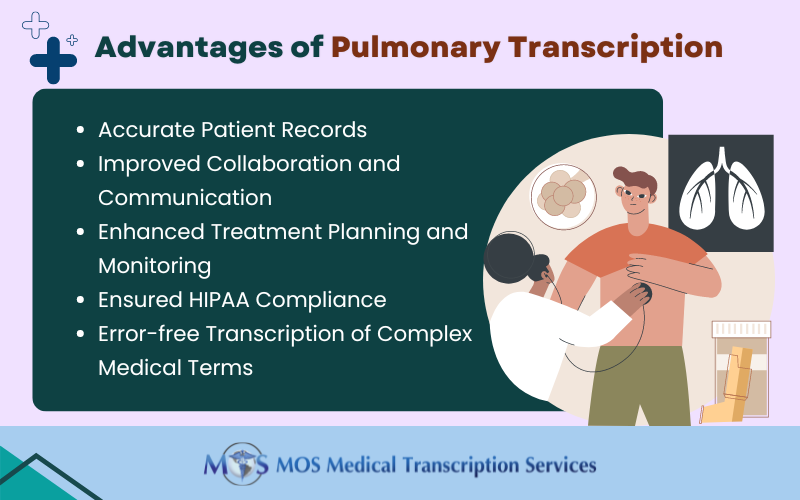
Table of Contents
Proper documentation is crucial for respiratory health management and treatment planning. Accurate and timely pulmonary transcription ensures precise and timely documentation about patients with lung disorder, enabling the healthcare team to collaborate more effectively and provide better patient care. Many pulmonary practices are now investing in medical transcription services to ensure quality charting.
Significance of Medical Transcription in Pulmonology
Evaluating and treating pulmonary diseases, especially in patients with chronic disease, requires an interprofessional team. Medical transcription companies understand the necessity of providing accurate and timely pulmonary transcription to support effective collaboration. With well-equipped human and technological resources, they can deliver high-quality medical reports and records for examinations, treatment, and follow-up. By integrating transcripts of medical dictations, reports, and notes into electronic health records (EHRs), medical transcriptionists help support care delivery, ultimately promoting better patient outcomes.
Advantages of Pulmonary Transcription for Respiratory Health Management

- Accurate patient records: Accurate and detailed patient records are essential for pulmonologists to make informed decisions about diagnosis, treatment, and patient care. By outsourcing medical transcription, pulmonologists can maintain accurate and detailed patient records. Using transcribed reports, pulmonologists can gain a comprehensive understanding of a patient’s medical history, aiding in the identification of patterns, trends, and treatment strategies.
- Better collaboration and communication: Transcribed medical reports serve as a valuable communication tool between pulmonologists, specialists, and other healthcare professionals. Clear and comprehensive transcripts ensure continuity of care and effective collaboration by providing detailed and organized documentation. As a result of this cohesive approach, multidisciplinary teams can work more efficiently and effectively, improving patient outcomes.
- Treatment plan and monitoring: Pulmonary transcription plays a major role in treatment planning and monitoring by recording treatment protocols, medication adjustments, therapeutic interventions, patient education materials, and discharge instructions. Comprehensive documentation facilitates seamless care, adherence to evidence-based guidelines, and proactive management of various respiratory conditions such as asthma, COPD, pneumonia, lung cancer, and pulmonary fibrosis. Additionally, routine transcription updates allow healthcare professionals to monitor disease progression, evaluate treatment effectiveness, and make necessary adjustments to care plans.
- HIPAA Compliance: In the healthcare field, having precise and compliant documentation is necessary for legal, regulatory, and reimbursement purposes. To maintain the confidentiality and accuracy of patient records, pulmonary transcriptionists follow industry standards, medical terminology guidelines, and confidentiality protocols such as HIPAA compliance. This also includes upholding quality assurance measures. Additionally, proper documentation plays a vital role in ensuring accurate billing and coding, preparing for audits, and implementing risk management strategies within respiratory healthcare practices.
- Complex terminology: Respiratory medicine has complicated vocabulary. Medical transcriptionists who specialize in this field can guarantee that terminology, acronyms, and diagnostic descriptions are correctly written. Their expertise in documenting respiratory illnesses and treatments improves the quality and clarity of medical reports, allowing healthcare providers to communicate more effectively.
As the healthcare landscape continues to evolve, proper charting of pulmonary care will continue to play a pivotal role in advancing respiratory health management and treatment planning. Providing pulmonary care will become more efficient, effective, and patient-centered with the integration of emerging technologies like telemedicine, wearables, remote monitoring, and digital health platforms.
Pulmonologists are required to be experts in handling infectious, inflammatory, structural, and neoplastic problems as well as diseases of the lung parenchyma, pleura, and airways in order to ensure that their patients’ lungs function properly. It is a responsible and time-consuming profession. By relying on competent pulmonary transcription services, pulmonologists can ensure accurate and useful documentation of their oral notes that will support efficient care delivery.


